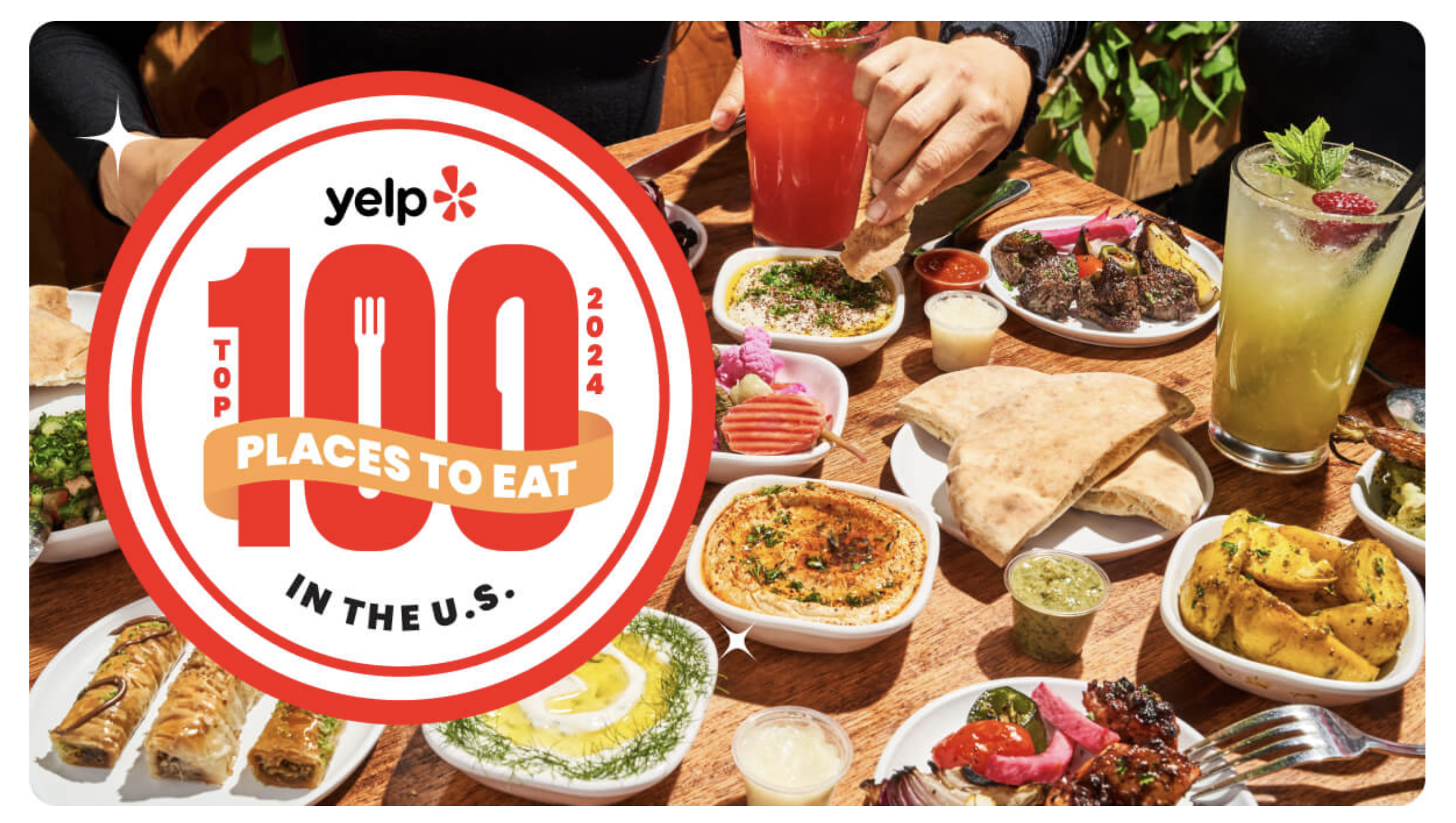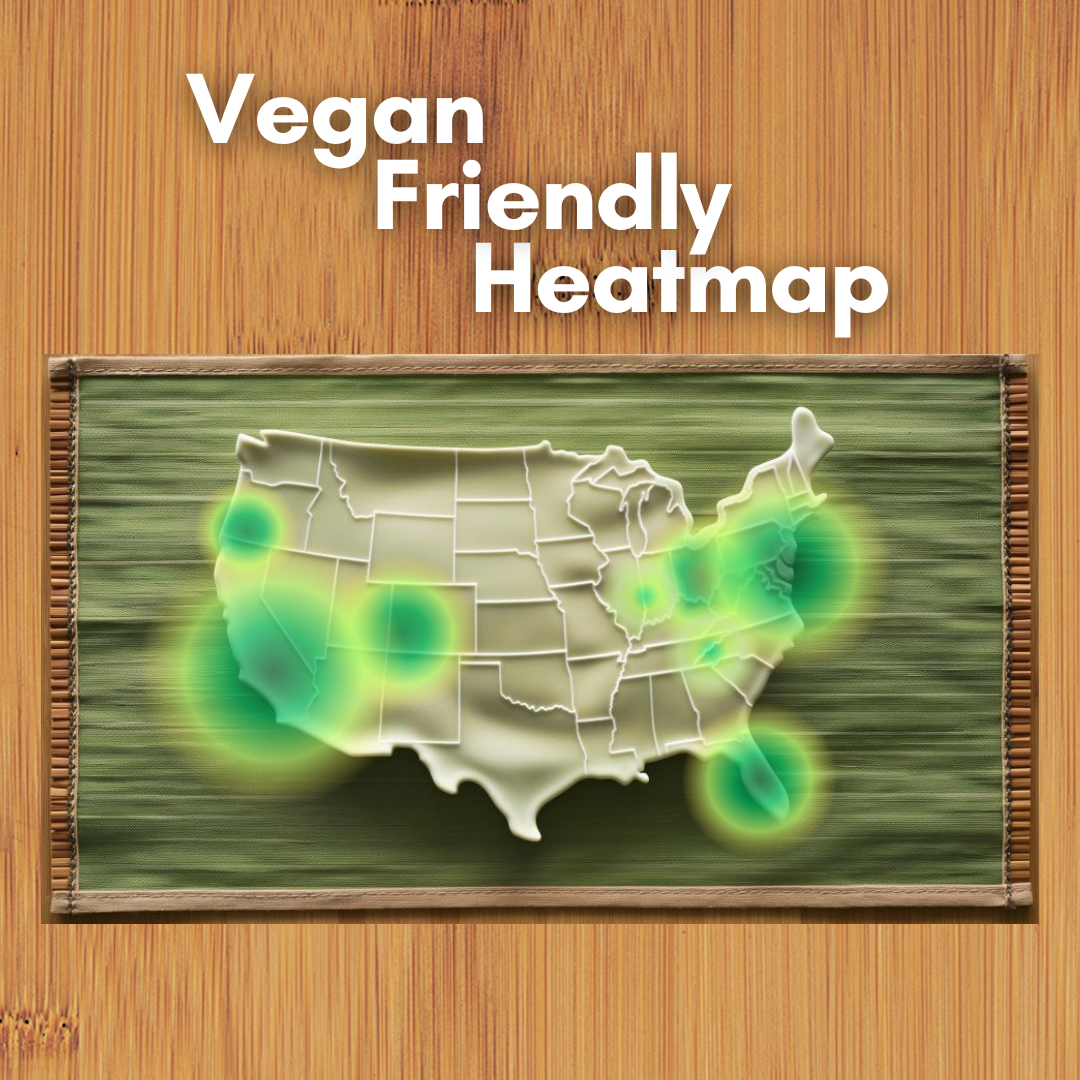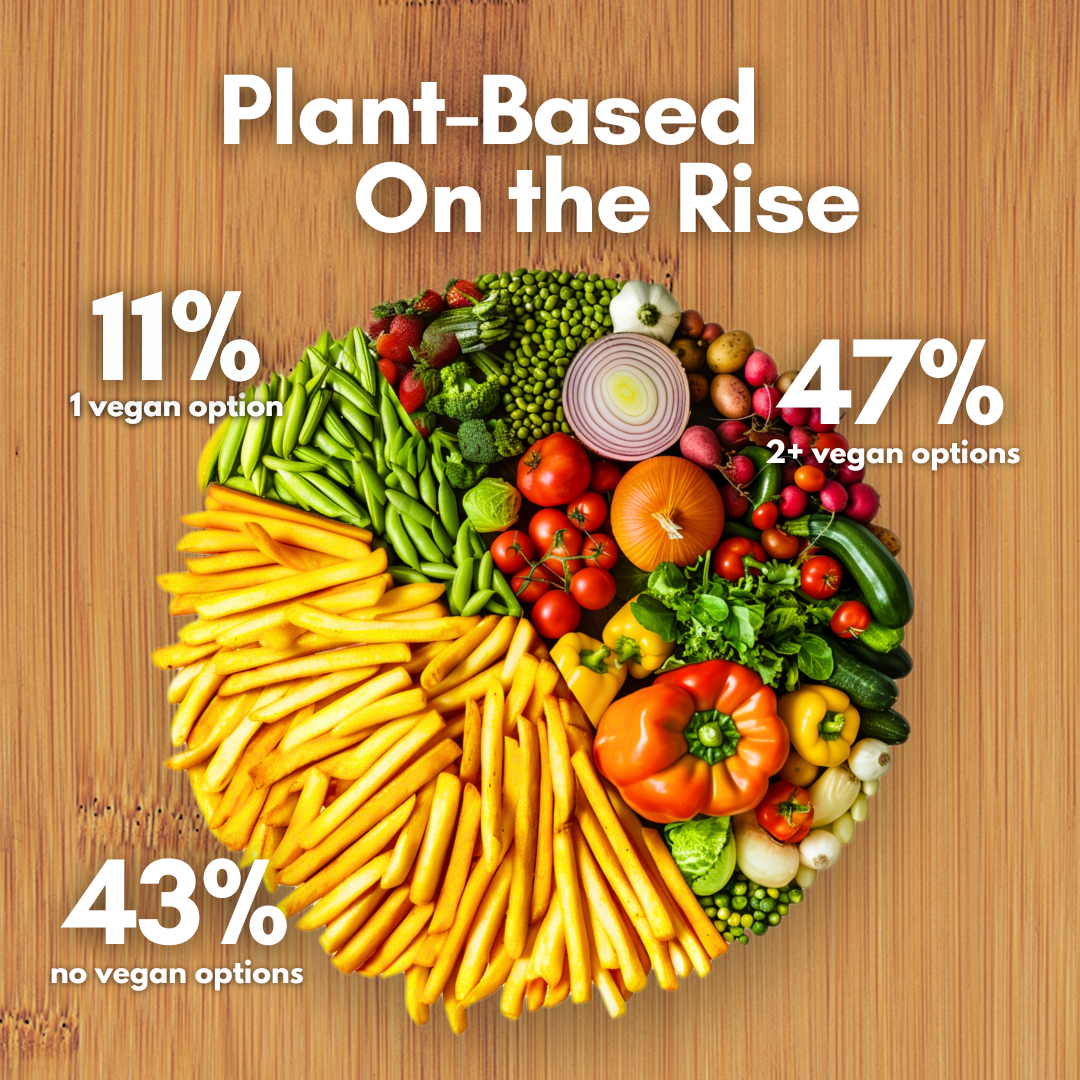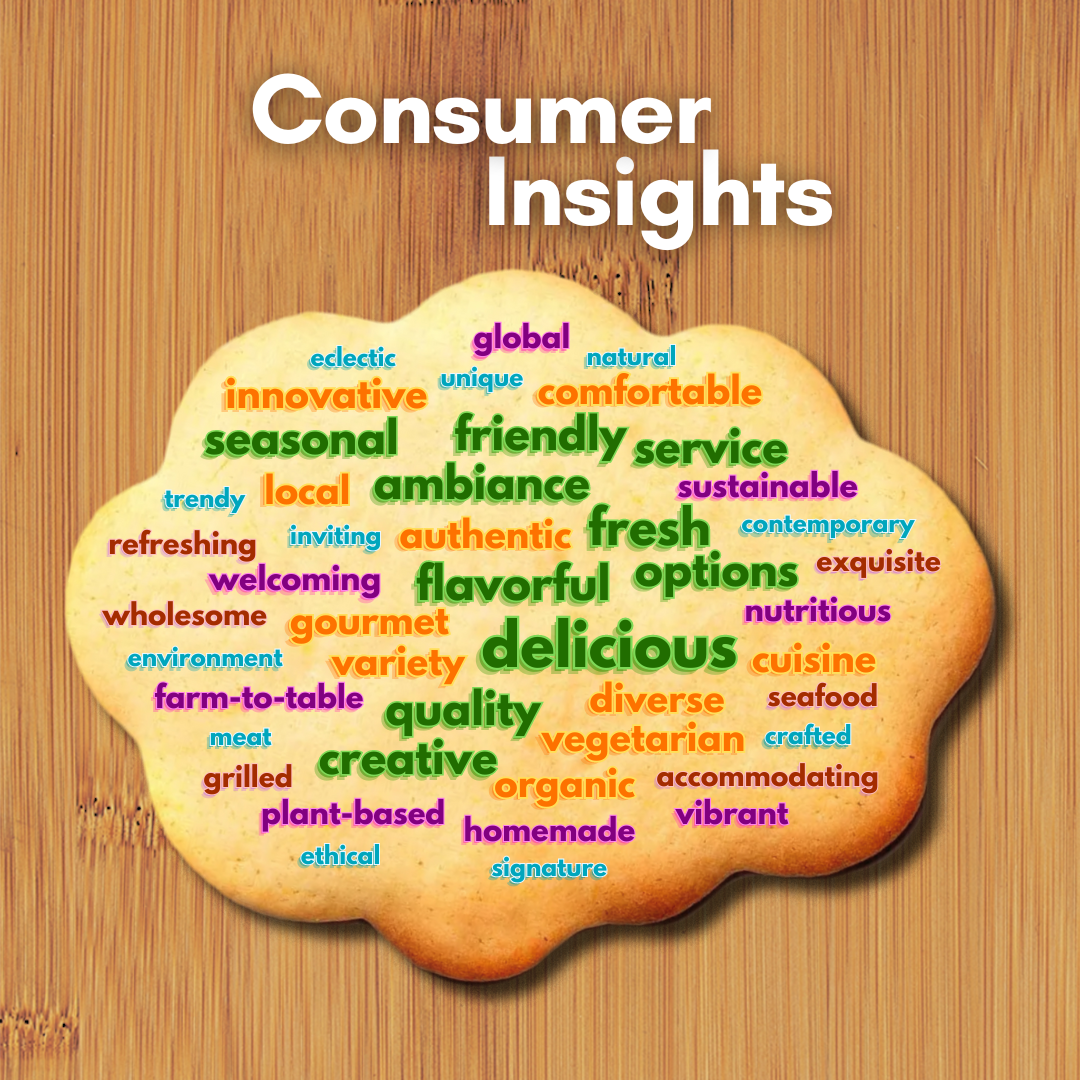Plant-Based Progress: Over Half of Yelp's Top 100 U.S. Restaurants Now Offer Vegan Options
/The culinary landscape of America is undergoing a profound transformation. In 2024, more than half of Yelp's Top 100 U.S. restaurants now offer vegan options, reflecting a significant shift toward plant-based eating. Notably, the restaurant that took the #1 spot this year is Tumerico, a vegan-vegetarian restaurant located in Tucson, Arizona. This trend is not just a fleeting dietary fad but a robust movement propelled by growing consumer interest in health, sustainability, and ethical eating practices.
image from yelp.com
METHODOLOGY
The writing of this article was a collaborative effort, involving an extensive review of menus and Yelp reviews from restaurants featured on Yelp's Top 100 list. Through meticulous data collection, we organized information within a spreadsheet, classifying restaurants by cuisine type, location, the presence of vegan options (one or multiple), explicit vegan labels on menus, customer feedback from Yelp reviews, and any notable or surprising features. This article explores the expansion of vegan dining across various states, the impact on business, customer insights, and the diversity of cuisines embracing plant-based menus, supported by compelling data visualizations.
GEOGRAPHICAL BREAKDOWN: VEGAN DINING ACROSS THE STATES (LOCATION HEATMAP ANALYSIS)
MAPPING THE PLANT-BASED WAVE
A location heatmap of the United States reveals the geographical spread of vegan options in Yelp's Top 100 restaurants. The data shows a dense concentration in states known for their progressive food cultures, such as California, New York, and Oregon. However, the trend is also catching on in unexpected locales, including the heartlands of Texas and the Carolinas, indicating a nationwide embrace of plant-based cuisine.
This geographical diversity suggests that the popularity of vegan options transcends regional culinary traditions, driven by a universal shift towards healthier and more environmentally friendly eating habits. Urban centers lead with a wider variety of vegan dishes, while suburban and rural areas are rapidly catching up, demonstrating the pervasive influence of veganism across different demographics and dining settings.
Impact on Business: Vegan Options and Yelp's Top 100 (Piechart)
A RECIPE FOR SUCCESS
A pie chart analysis of Yelp's Top 100 restaurants illustrates the business impact of offering vegan options. Of the establishments surveyed, 58% now boast at least one vegan dish on their menus, with 47% offering multiple options. The data highlights that restaurants with diverse plant-based offerings experience higher customer engagement and positive feedback, translating into better overall ratings, increased foot traffic, and notable revenue growth or customer retention rates.
Restaurants that have wholeheartedly embraced a comprehensive vegan menu have seen a noticeable growth in patronage and become beacons of success in the industry. This shift, which aligns with ethical and environmental values, has proven to be a savvy economic strategy in an increasingly competitive dining market. Their success stories attest to the potential benefits of inclusivity and innovation in menu planning.
The substantial percentage of top-rated restaurants that offer more than one vegan option reflects a strategic response to growing consumer demand for diverse and high-quality plant-based dishes. This approach not only caters to the dedicated vegan population but also appeals to flexitarians, those who are reducing their meat intake, thus broadening the customer base. These establishments are capitalizing on the trend by enhancing their menu variety, which in turn drives repeat visits and higher customer satisfaction. By integrating multiple vegan options, these restaurants are not only adapting to current market trends but are also positioning themselves as forward-thinking leaders in the culinary world, setting a benchmark for others in the industry.
CHALLENGES IN ADOPTING VEGAN ACCESSIBLE MENUS
Not all transitions are seamless as the restaurant industry increasingly embraces vegan cuisine. Establishments face notable challenges, from sourcing high-quality plant-based ingredients that meet taste and texture standards to retraining kitchen staff to handle these new menu items skillfully. Additionally, balancing a menu to appeal to traditional and vegan diners without diluting the restaurant's brand identity or alienating its existing customer base poses a strategic challenge.
Economic considerations also play a crucial role. The cost of premium vegan ingredients can be high, and the initial investment in marketing new vegan dishes can strain budgets. Additionally, the fear of not selling vegan options alongside traditional dishes can deter some restaurateurs from fully committing to this menu expansion. Addressing these challenges requires careful planning, innovative problem-solving, and a willingness to adapt to evolving dining trends.
Customer Insights: What Diners Are Saying (Word Cloud Analysis)
VOICES OF THE VEGAN DINERS
A word cloud analysis of reviews from the top half of Yelp’s Top 100 restaurants reveals overwhelmingly positive feedback on vegan dining experiences. Terms like 'innovative,' 'fresh,' 'delicious,' and 'satisfying' dominate, highlighting the widespread appreciation for vegan dishes. This positive feedback should not only intrigue but also inspire food enthusiasts and individuals interested in vegan dining to explore the expanding world of vegan options, fostering a sense of optimism about the potential of vegan dining.
Our analysis highlights the importance of providing vegan options and ensuring these offerings are on par with traditional menu items regarding taste and creativity. Restaurants that succeed in doing so are often celebrated for their inclusive and forward-thinking approach, fostering loyalty among a broad spectrum of diners.
BROADER SOCIETAL IMPACTS
The surge in vegan menu offerings is not occurring in a vacuum. It reflects broader societal shifts towards environmental sustainability, health consciousness, and ethical concerns about animal welfare. As public awareness of climate change increases, so does the demand for dining options that align with eco-friendly practices. Restaurants that offer vegan dishes are more than allies in the fight against environmental degradation but are innovators within a movement that values ethical consumption. This societal impact should emphasize the urgency for restaurants to align with these trends.
Additionally, the health benefits associated with a plant-based diet, such as lower risks of heart disease and obesity, attract health-conscious diners. By aligning their menus with these values, restaurants do more than cater to a niche market—they contribute to public health and environmental efforts, enhancing their corporate social responsibility profile.
Cuisine Diversity: Exploring the Types of Vegan-Friendly Cuisines (Treemap Chart)
A GLOBAL PLATE
A treemap chart, a visual representation that uses nested rectangles to display hierarchical data, depicts the diversity of vegan-friendly cuisines. This chart is handy in understanding various culinary traditions that have integrated plant-based options. Mediterranean and Asian cuisines are led by their traditional reliance on plant-based ingredients, followed closely by American and Mexican restaurants innovating with vegan adaptations of classic dishes.
This visual representation emphasizes the creative culinary techniques catering to vegan diners, ranging from vegan sushi in Japanese restaurants to plant-based tacos in Mexican spots. The chart reflects the adaptability of various cuisines to veganism and the growing culinary creativity that is expanding the boundaries of traditional plant-based cooking.
FUTURE TRENDS AND INNOVATIONS IN VEGAN DINING
Looking forward, the landscape of vegan dining is ripe for innovation. The development of new plant-based proteins and the refinement of alternative cooking techniques promise to expand the variety and appeal of vegan dishes. Culinary technology, such as 3D food printing and AI-driven recipe development, might also help create complex vegan dishes that mimic traditional flavors and textures even more closely.
The vegan market is also likely to surge in gourmet and culturally diverse offerings, moving beyond simple substitutions to original culinary creations that draw from various global traditions. As the demand for such options continues to grow, we can expect a significant transformation in how restaurants conceptualize and execute their menus. This shift will likely influence the broader food industry, pushing more food producers, distributors, and restaurants to consider how to meet the increasing demand for sustainable, health-conscious dining options.
ESTABLISHING NEW NORMS
The dominating presence of vegan options within Yelp's Top 100 restaurants signifies a notable transformation in the restaurant scene, reflecting a departure from fleeting trends to address deeper societal demands for sustainability and wellness. This strategic adoption of plant-based menus is not just about inclusivity; it's proving an effective business strategy poised for future success.
Restaurants skillfully adding vegan dishes align with consumer trends and establish norms for environmental responsibility. This active approach meets the growing demand for ethical and health-focused dining, giving these businesses a competitive advantage and broadening their appeal.
As understanding the environmental and health impacts of dietary choices expands, the movement towards plant-based dining is certain to pick up pace. Restaurants that continue to innovate and broaden their vegan offerings are not only reacting to market shifts but guiding the industry toward more sustainable operations, such as creativity and adaptability are essential in the rapidly changing dining sector.
Ultimately, the availability of vegan options in Yelp's Top 100 restaurants is more than a reaction to consumer preferences—it's a strategic choice by restaurateurs to align with global shifts towards sustainability and ethical practices. As this movement grows, it is sure to reshape the future of dining in America, fostering a more comprehensive, inclusive culinary environment. Plant-based cuisine's ongoing growth and acceptance highlight a shift that promises a more sustainable and creative dining experience. We invite you to explore the vegan options in your local area and experience the innovative, enjoyable dishes that redefine culinary standards.
ARTICLE CREDITS & CONTACT INFORMATION
Analysis, Image Generation, & Writing: Darnell Davis & Rosarian Cook
Research: Meredith Marin, Juliette Arnold, Darnell Davis & Rosarian Cook
CONTINUE THE CONVERSATION
Learn more about our consultants and contact a consultant in your region.
Our team would be glad to audit your menu and provide useful feedback. Learn more here.
Would you like help with adding vegan options to your restaurant’s menu? Fill out this quick form and we will reach out to you.
Do you represent a hotel that welcomes vegan guests? Find out how to get awarded with our hotel certification.
Questions? Here is our general contact form.






